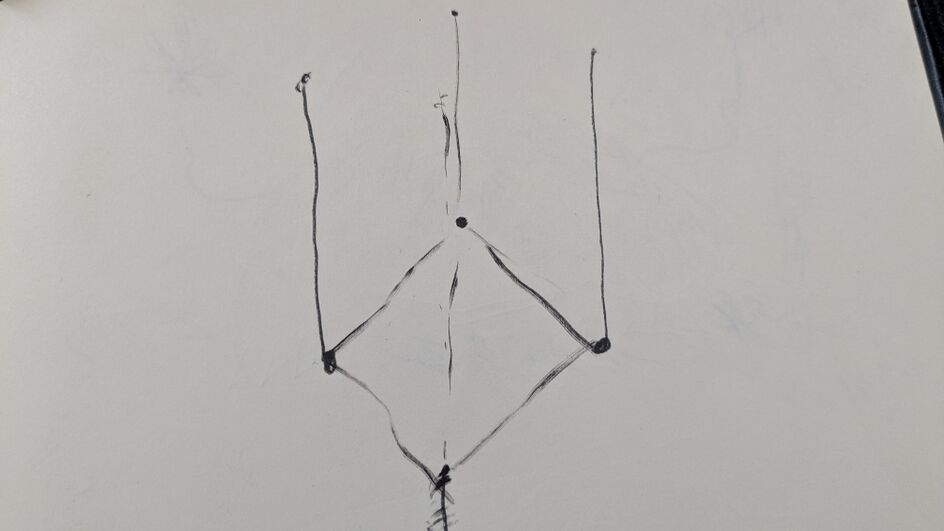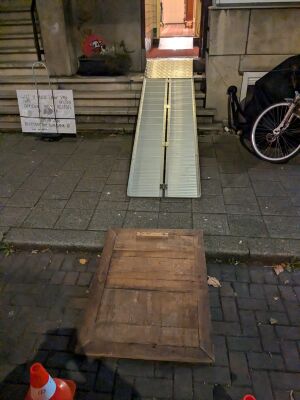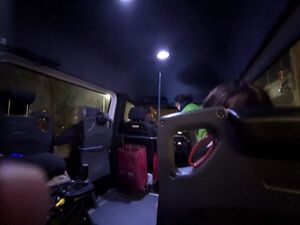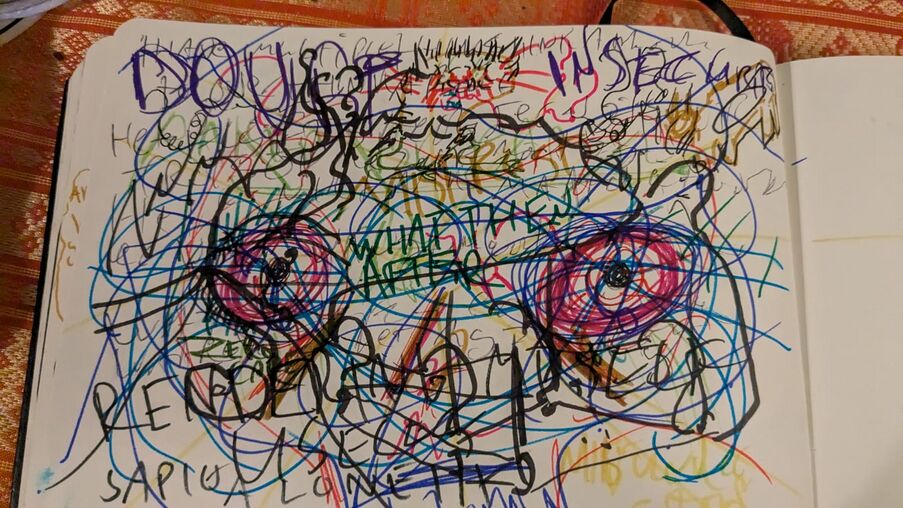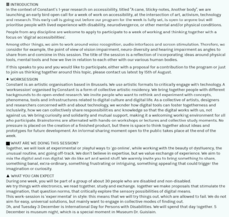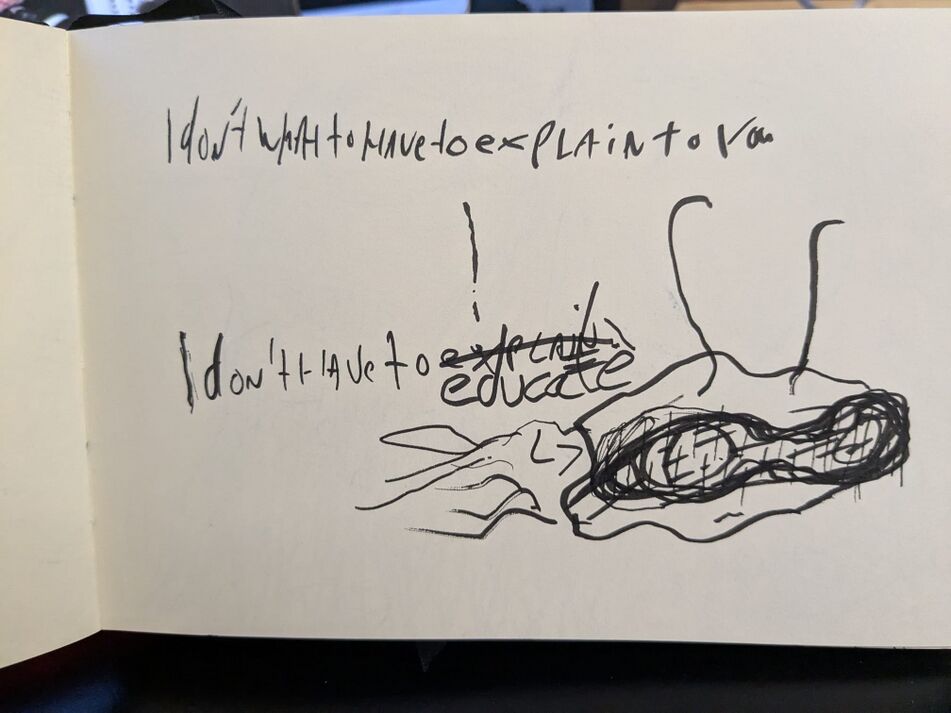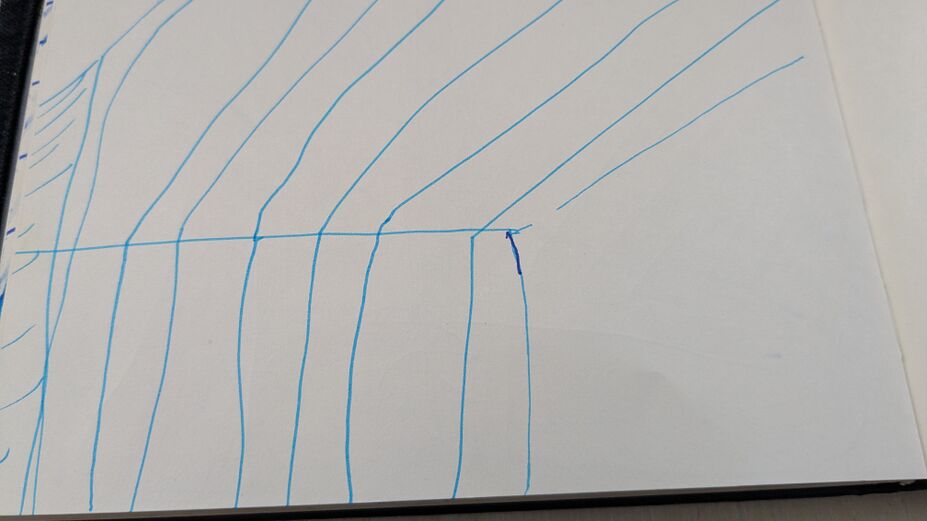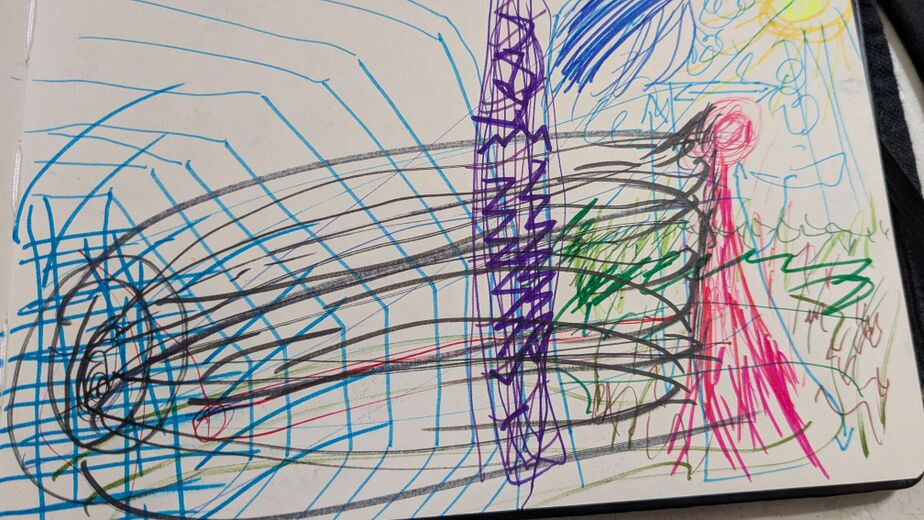User:Lor.ensō/contextures
Perfect timing! I suggested edits here:LorenzoThesisDraftSteveSuggests, Lor.ensoDraftSteveSuggestsLatest (March fourth) suggestions LorenzoThesisDraftMarch4
Contextures, a thesis by Lorenzo Quint
Thesis submitted to: Piet Zwart Institute, Willem de Kooning Academy, in partial fulfilment of the requirements for the final examination for the degree of:
Master of Arts in Fine Art & Design: Experimental Publishing (XPUB).
Adviser: Steve Rushton
Second Reader: Marloes de Valk
Word count: [approx 5000 (feb 25)]
Introduction
Traveling around the city of Rotterdam with my brother, who is in a wheelchair, has made me aware of the architectural, cultural and bureaucratic limits that define our movements. In this Thesis I will reflect upon, (de)construct and criticize Rotterdam. I will reflect on Rotterdam in contrast to the utopian postcard realities that I experience in the city. In this text called Contextures, I develop a "counter-mapping" [1] practice in relation to the issue of accessibility in Rotterdam. This will take the form of the transcription of a series of drawings which I made whilst writing Contextures. I will also use my knowledge and experience in world building with 3D software. [2]
The text will be structured by the following themes, each of which represents one of the multiple obstacles to getting around.
Socially - Personal, Affordable, Family, Housing
Accessibly - Disability, Information provision, infrastructures
Bureaucratically - Protocols of local municipal / governments
Architecturally - Buildings, ways, pavements, roads, streets
Virtually - Imagery, impression, media, softwares, simulation, games
Culturally - budget cuts, false iconism, counterculture, grassroots, community, festivals/gigs/events
*The thesis comprises a series of chapters*
*Each chapter comprises annotations of a drawing*
*Each drawing focuses on one (or two) of these aspects related to accessibility:*
Before I will talk about situations, locations and access, I will pinpoint my own relation to my findings. Consider this a small biography relating to me and my close family in order to understand the Contextures.
I am born and raised in Rotterdam. I have lived in the North/Centre of Rotterdam for my entire life. Which is convenient because of the multiple ways to get around to places. I have been diagnosed at an early age with Asthma, PDDNOS(now best known as the ../other folder of the Autism Spectrum)[3], ADHD & SOTOS Syndrome[4]. The latter had an effect on my balance organ and because of that I can't practice my Dutchness of riding a bicycle. Which is also answer to the frequently asked question: "Huh? You can't ride a bicycle?" which is then followed up by "I thought everyone in the Netherlands could ride a bicycle!". These diagnoses put me in a position in early life that is called 'special'. We have 'special education' which basically means your education is based on or around your specialty (or without sugarcoating: your disease/disorders).
My father (1957-2023) has worked in the government as employee/staff/advisor/head of IT all in the sense of ministries considering information provision. My father would have gone into retirement in November 2023. In the Summer of 2023 he had excruciating back pain to what we thought might be related to age, he was referred to physical specialists/therapists but when he went for a scan in hospital and in the end of September 2023, it turned out to be metastatic cancer in such a state that even extending his live through new innovative techniques would not provide him of the retired live he deserved: Often cycle around to do chores, reading and sometimes go out for entertainment or food, whilst being together with us. He truly was the pillar of strength in our family. And also in the sense of having a car, driving us around (mostly for my brother and mother).
In the beginning of October, he passed away after a short but intense time of illness. This was around the beginning of my studies at Experimental Publishing.
Since 2016, my mother has a medical condition. She has a stoma [5]with damaged/stitched colons. She is dependent of medical appliances such as olimel[6] and water next to a stoma. She also sometimes need medical attention; she needs to go to a hospital for check ups.
Since 2019, my brother has non-congenital brain injury. He can not stand, walk so he is either sitting or laying. He has an electric wheelchair and a mobility scooter.
All the beforementioned things considered, disability mobility, accessibility and such are huge part of my life. Before XPUB, my previous graduation work; Happytalism[7] was a critique on wellness / new age / spirituality which revealed to be harmful during the COVID pandemic. In my thesis A Guide To Nether-Hell : A Journey Through Depiction & Experience From A Nether-Divergent Perspective, I describe the damage of enforcing normalcy in relation accessibility and disable, but also the idea of an alternative in sense of subculture and community. [8]
As my father passed away at the beginning of my time at XPUB, I / we went through a shift in family dynamics and we had to make a lot of changes in our life. As I don't have a driver's license. My brother needed to apply for Social Taxi (which I will go into detail later) in relation to his inabilities. My mother needed to apply for the same taxi but a different service and also for domestic help. I have helped there but I also felt the need to pick up my own life. The situation has changed and we are slowly but steadily are trying to the make the best of it. Whilst being at XPUB which means prototyping and learning about methodology and systems and structurelessness and nudging etc, we are doing same kind of things in relation to the gemeente.
And from these points of view I tend to look at the contextures.
ConTextures are a portmanteau of the following words**
Con = "an instance of [deceiving] or [tricking] someone. / [persuade](someone) to do or believe something by lying to them." (CITE) Context "the circumstances that form the setting for an event, statement, or idea, and in terms of which it can be fully understood." (CITE) Textures "Texture is the physical feel of something — smooth, rough, fuzzy, slimy, and lots of textures something in between. Sandpaper is very rough — it has a gritty, rough texture. Other things, like linoleum, have a smooth texture. Texture has to do with how an object feels and its ingredients."(CITE)
Contextures is how I see the modern Rotterdam renders and promises. The rendered textures do not calculated the context of the city. They are a deception and a broken promise that sends out a certain feel of the city outwards to new potential buyers, visitors and inhabitants. Ofcourse there is no trust to be found in the realtor concerning postcard surrealities that show an artist impression before the wasteland on which the new building is currently emerging.
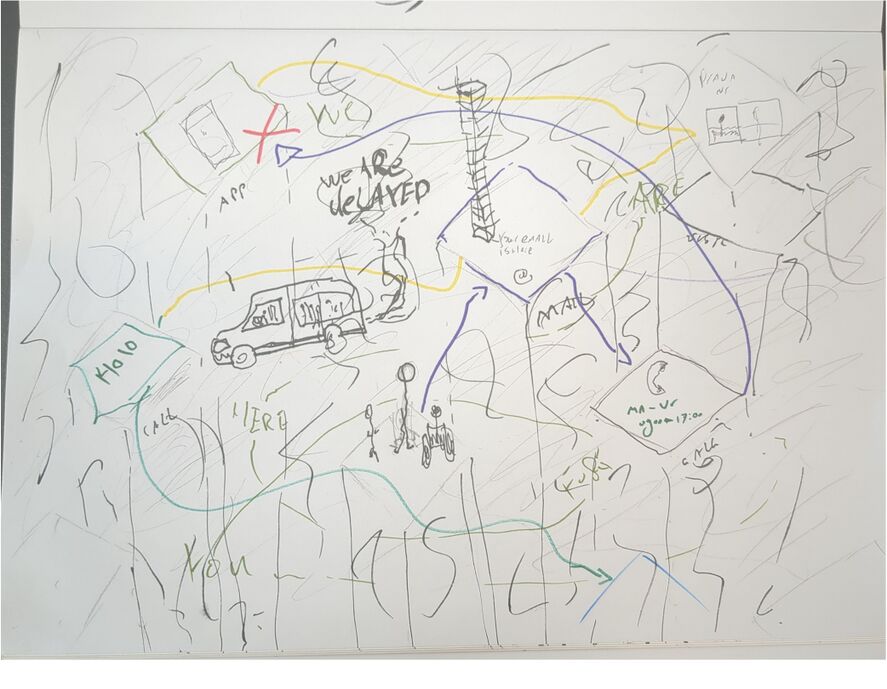
These issues become invisible. When people do not see them. they do not exist.
Chapter Outline
The three chapters of Contextures group the above into pairs:
- Socially - Accessibly / (un)Familiar barriers, social thresholds and unmeant ignorance I refuse to allow myself to fall in a pit of despair. This is a healthy reflection on the topics; reacting honestly to a complex of issues in search for (alternative) mechanism.
- Virtually - Architecturally / Innovation and Virtual Tools as development or demolition of reality
- Bureaucratically - Culturally / Zoning: friction between counter culture and bureaucracy, false iconism vs community
DRAWING_1/GET AROUND/ Socially - Accessibly - Bureaucratically / (un)Familiar barriers, social thresholds and unmeant ignorance
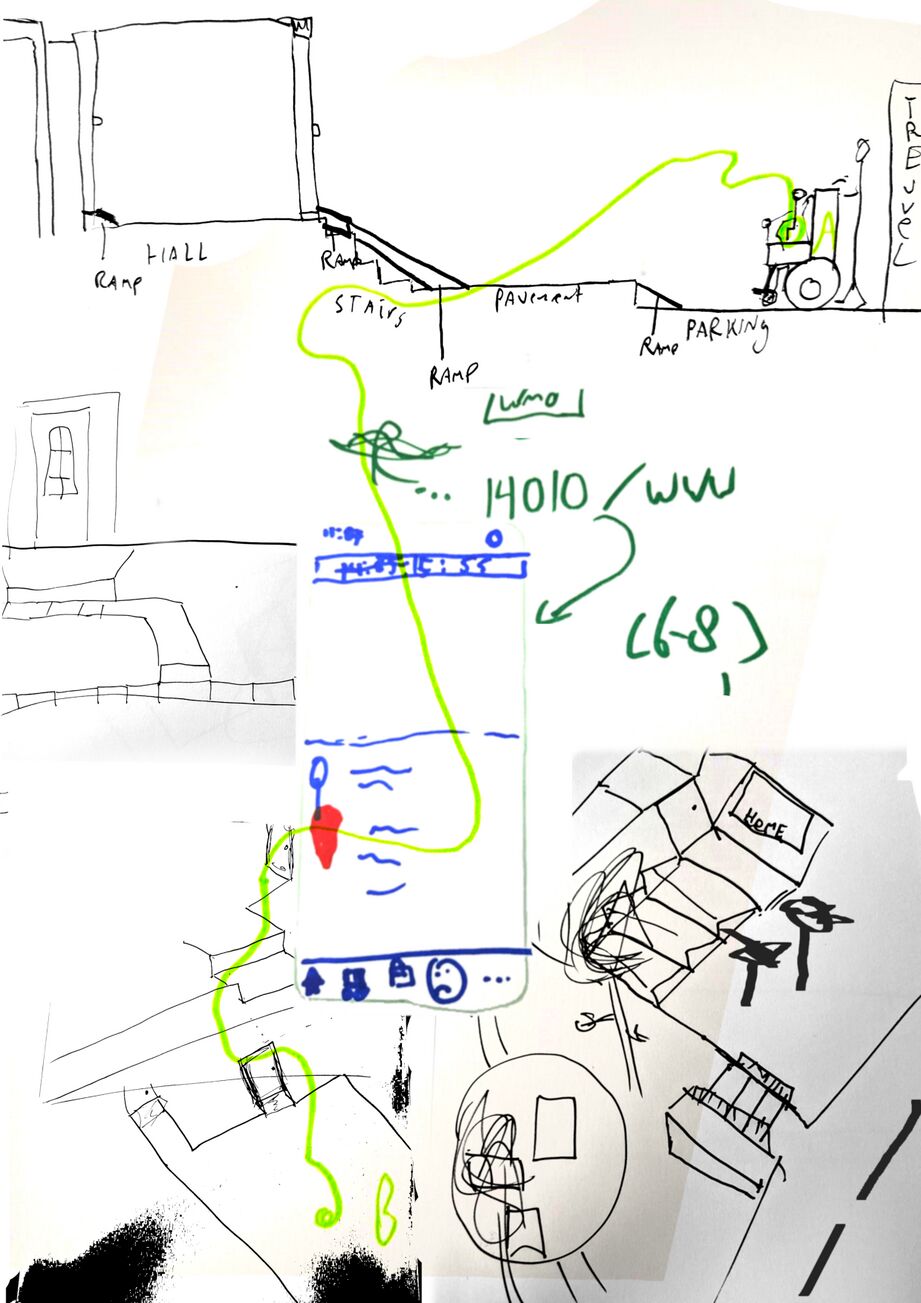
In the top right, it is me pushing my brother from street level, to pavement, over the ramp inside onward towards inside.
Below the hall there is a front door view of where my aunt and uncle live. Which is a multi-threshold construction of tiles, bricks and pavements, resulting into a tight door which isn't wide enough to fit my brothers wheelchair into.
In the middle of the image. Is a sketched version of the Trevvel app-interface based on the ride booking/reservation screen. Above this screen is a sketch of the Gemeente logo with the word of WMO (law for societal support) and the number 6-8, indicating the weeks it can take before you know if you qualify for Trevvel.
On the right side of the interface. A sketch based on the front door situation of my Nephew's recently bought house. (Looked at above from Google Earth) Where we met up to meet his kid and showing us through the house. My brother couldn't get in because of, once again construction of tiles, bricks and pavements. With another social threshold that could have been helped, had we the knowledge of entrance, since we do have ramps to get past this. Wouldn't know if he would fit inside, though.
On the bottom left, there is the possibility of a back door of my aunt/uncle's place. Which we didn't use in the end.
The A to B line in bright green hovers over the different thresholds. To show what bizarre detours have to be done to get complete the route, not even mentioning the delays.
Socially - Accessibly / (un)Familiar barriers, social thresholds and unmeant ignorance
In this chapter I aim to show the preconceptions that are often there about the multiple obstacles to and how these become invisible when people are unaware. When people do not see it. It does not exist.
I am zooming in from the big picture to a personal experience. The questions I'm currently asking is:
How does one Manoeuvre [9] or get around 'town'?
Starting with myself: I can not ride a bike, so I either walk, take public transport, take a cab or carpool with someone. My brother can not walk, he is in a wheelchair or mobility scooter, so public transport mostly isn't an option. He can be transported from bed to wheelchair, from bed to mobility scooter, from wheelchair to a car.[10]
It is mostly the case he gets around with something that is called Trevvel[11] He manoeuvers around in his mobility scooter for longer distances and for shorter distances, he uses his electric wheelchair. One would assume that this fixes a lot of problems, which is true but still he meets a lot of obstacles on the way.
Here's an example of a difficulty I encountered. I intended to go to a friends Halloween party. I needed to get there via metro and bus. I couldn't stay there, and the option of a taxi with a big group was too expensive. Another friend offered a place to stay, but that was only accessible via bike. I didn't go in the end, but that kinda struck to me. This wasn't the end of the world, just a bit shitty and I felt a bit left out, even if this was well intended.
The frustration I felt through being presented with a series of comparatively low thresholds made me consider my brother. The thresholds that occur along the way for him: from a pavement without hills or ramps, to bureaucratic, social and architectural thresholds are of a different order.
Here's an example of a difficulty my brother encountered. My aunt wanted to plan my grandfather's birthday at their place in Spijkenisse, but they were worried that my brother can't access the hallway, because it is too small and the chair might damage the varnish. The other option was that he comes in through the backdoor but that was also inaccessible due to the same compact measures and fear of damage.
My mother came with the idea that we would do it at 'our place'. Which means I have to 'work' for this: I sometimes help my mother as a Mantelzorger. [ informal caregiver ].[12]
Every 4-6 weeks, my brother, mother and I have a little get together. Because, if I want to meet with my brother and mother at my mother's place, it takes some preparation:
The mobility scooter is too heavy for the ramp, he needs to get there in a wheelchair.
For my brother to enter my mother's house, we need*:
- to reserve the parking spot before the pavement by addressing neighbours, people on the street. [13]
- to place a hill or a plank on an empty parking spot
- to place a plank/hill from the street to the curb
- to place a ramp from the curb that which transitions into another a hill(small ramp) going into the hallway
- to place another small ramp in the corridor to enter the entrance hall.
*The ramp and hills needed to be purchased.
- The ramp and hills need to be stored.
Quite the protocol on its own with these steps to make.
My brother has multiple ways to manoeuvre around, which gives him freedom. To get these things, there's a process that has to happen via the municipality. For this, he needs to get the 'social' version of Trevvel [11], called Trevvel Samen'.[14] Applying for this takes 6-8 weeks [15] and is done through the Gemeente via communicative layers of bureaucracy.[16]
You would say this system would be great, customized for the person. The wonderful idea of social transport and traveling together and having a customized travel based on your necessities. But it has been quite the 'ride' so to say. Concerning my brother and mother. It either can go well and as it should be.
But when requesting a ride, you can reserve a booking via the app or call the company. It just works like a regular taxi service. It gets communicated via some sort of telecommunication device :
## \\\\\\\\\\\\\\\\\\\\\\\\\\\\\"I'mavailable"\\\\\\\\\\\\\\\\\\\\\\\\\\\\\\\\\\\\\\\\\\\\\\\\\\\\\\\\\\\\\\\\\\\\\\\\\\\\\\\\\\\\\\\\\\\\\\\\\\\\\\\\\\\\\\ ## //////"We have a ride from Boermarke 65 to Statenweg 127a" ////////////////////////////////////////// ## \\\\\\\\\\\\\\\\\\\\\\\\\\\\\\\\\\\\\\\\\\\\\'Yes I will take that one'\\\\\\\\\\\\\\\\\\\\\\\\\\\\\\\\\\\\\\\\\\/////////////"Okay"///////////////////////
My brother then communicates that he has a ride planned. He sends us a message and we set up the small and large ramps. We tip the driver based on the fact if they help, are friendly, cooperate and participate.
There are a few social factors and flaws in dealing with these procedures. Not only from services but also to close relatives:
We wanted to book a ride that picks up my mother and me[17] and then also picks up my brother[18]. That wasn't possible, because there has to be an hour between rides. So we, in that matter, needed to be picked up and brought to my brother. And then we would join him on the same ride. We then decided to go separate and ended up being picked up in the same bus.
This ride was heading to my nephew's house.[19] We would visit and look at his new house, meet his newborn. We were there on time and then the same family was not thinking about my brother's situation, were unintentionally ignorant. My nephew has these concrete tile stairs. So this house becomes a liminal space to my brother. It is highly upsetting that in these vinex type lifestyle arrangements of normality, there seems to be some sort of tunnel vision of new town nuclear family type of normality. A modern village in this Truman Show type of aesthetic.
Even though my nephew is a sweetheart and does not have any bad intentions, it doesn't come to mind to him that my brother has been impaired since 2019, needs to be taken into consideration. It was a hot summer day (just imagine the shitty day it would have been if it were raining the entire day and to just be sitting in the rain.
.. but we just continued our nice meeting as planned. And as our ride was there according to schedule, my mother and I were picked up apart from my brother, he was picked up the moment when we arrived at my mothers place. Resulting him to finally be home an hour later than us.
Continuing in Spijkenisse in the summer to the winter back towards the next organisational madness: organizing my grandfathers 89th birthday.
Our solution became that the three of us[20] went to my grandfather for custom version of my grandfather's birthday. My mother and me were picked up around 13:00.
My brother was in another bus and the driver picked up other people, so it took a while in traffic. A very important bridge in the area was under construction which redirected traffic to all of us. Meaning my brother would be at the birthday 1,5 hour (!!!) later than us.
Returning, we were supposed to leave at 16:45(as our ride was scheduled), but we had to wait an hour to be picked up. My brother started to get tremors (myoclonus [21]) because he didn't have his medicine (we assumed he was going to be home in time).
The way back was bizarre: The bus needed to pick up people in another location; and just before we reached my brother's house, the driver picked up another person at the Saint Francis Hospital (SFG) in Rotterdam[22]. My brother was not doing well, getting pissed off and tired, which was influenced by and influencing his 'shaking'. When we were finally were heading to his home in Crooswijk. The last picked up person squished herself out of the bus when we were almost at our own space. Whilst we could have also requested the same but chose to be less egotistical.
The most recent thing as I am writing this, is Christmas brunch, where social and logistical struggles continued to new limiting thresholds and even lower deeper valleys. We planned a Dunch with my grandfather, brother, mother and me. My grandfather around was there at 14:30hr and my brother was supposed to be there at 15:00hrs. Due to the organisational clusterfuck at Trevvel, my brother arrived there around 17:00hr. Not only did my brother have to wait in a very insecure manner, at the same time, his wheelchair was having some technical difficulties, which lead to me pushing him up the ramp with x3,5 strength because of a double brake effect as a result of to handles 'hugging eachother' that weren't supposed to cross.
But then of course, the bus was there too early for the ride back. My brother was heated with anger and said he wanted to finish his dinner and that he would call for a new ride.
These are a few of the many stories of how customized so called "social" transport, still has plenty of drivers and systems that are not listening to the needs of the travelers. And the fact that people need to wait 6-8 weeks depending on their situation if they qualify for this?! My brother in this case ends up less healthy and supported than this Social Support Law and Customized Transport.
This is story exemplifies the degree of mental and physical preparation required to move through the city. There are MANY day-to-day transactions that require understanding and knowledge; it requires a municipal threshold; it requires physical support and aftercare and rest afterwards.
There are multiple obstacles to getting around, socially, accessibly, bureaucratically, architecturally, virtually. And these become invisible when people do not see this. When people do not see it, it does not exist.
/DRAWINGS TWO&THREE/Virtually - Architecturally - ..culturally?/ Innovation and Virtual Tools as development or demolition of reality
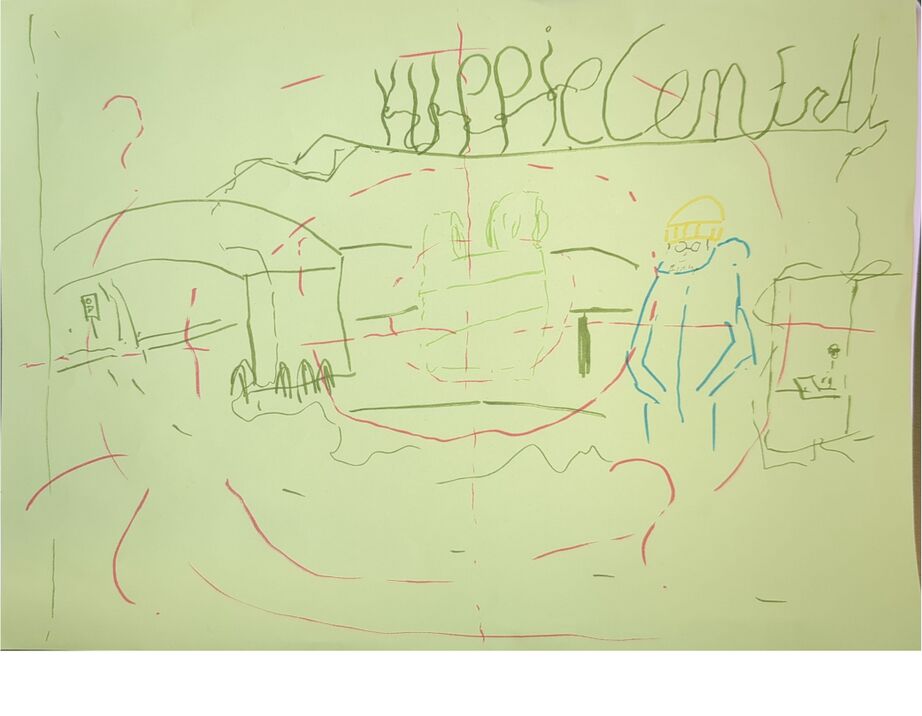
I see the stereotype of how a yuppy or hipster looks like, claiming a space or a stage in the theater of the street. Inside the coffeeplace/bicycle repairshop. There are always people catching up and working, and there is nothing wrong with that. I do not have strong emotions against local facilities. However, I do tend to think aggressively when I do my groceries at the local mall that is next to this new hotspot.
When I walk there see people drinking coffee, and getting their bikes fixed. Combining that with the recently opened Station Bergweg[23], gives me a double feeling. The Eudokia square, is a local space where multiple groups of people meet or hang out, but also with their contexts, waiting for the local municipal building. I feel a certain barrier or gray area in that harsh location. And it feels like these new hotspots rather distract mask than improve it. These facilities potentially brighten up the area, but what do they offer to their location? My mother lives in Blijdorp and since 2014 there is a pizzabakery next to her place, which is truly an amazing group of semi-neighbours. At the end of the street, there Sajoer, which is a hip coffee/juice place that generates a certain 'gezellig' atmosphere on the street but also invades the street in relation to the people living in there. There is again the paradox of a meeting place that also expresses a certain disregard.
As I walk at the Berwebg in a very bad mood, I sometimes feel like aiming my mental target as an offense to what I call SusanBij(l)olence. As this portrays a certain socialite/urbanite elitist 'look how culturally I am' and I think this is the core of my 'being a Rotterdammer' which gets salty. There is an ice cold 'niet lullen maar poetsen' / 'opgestropte mouwen'-mentality which is part of the local identity and I think in the GeoPsychological matter that this then gets opposing towards 'Aanstellerij'. And this attitude is something that is a reaction to what seems to be eternal inaffordability and how this city is developing. But is it developing?
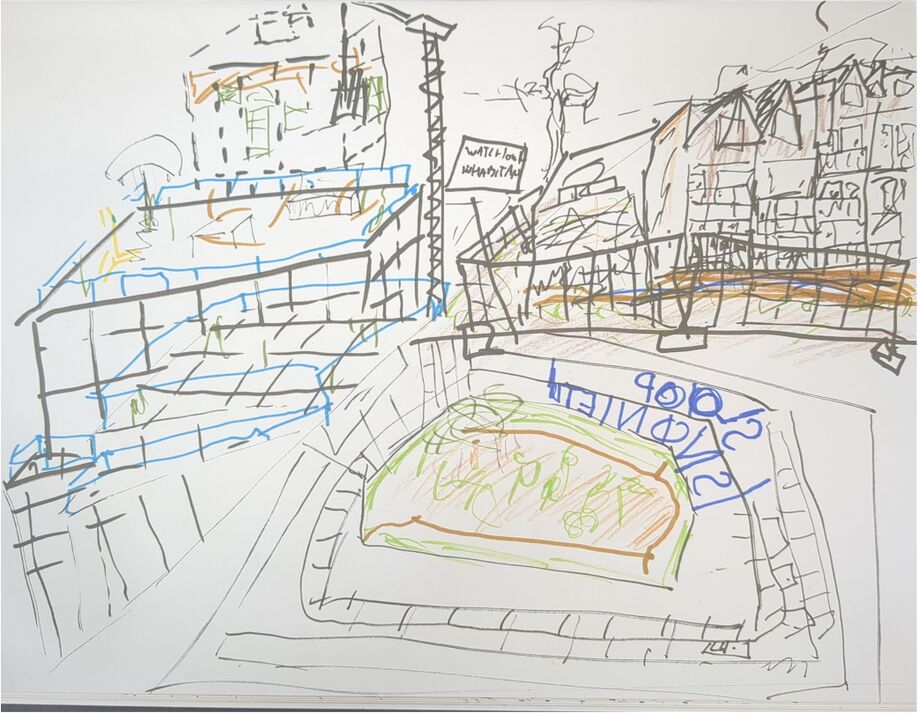
On the left, the tower is emerging from the post office next to the City Hall. I see it when I walk to the academy and back and it gives me the 'live feed' feeling that architecture is being rendered. Under this building, the top surfaces of the Timmerhuis is visible. Which is a modern apartment complex that also 'gives shelter' to a brewery, museum Rotterdam and municipal services offices. It is quite typical that these are together, because in the Timmerhuis, the municipal office of VONK (the Innovation Center of the Municipality of Rotterdam) is located.
On the right is a portrait of the remains of the Tweebosbuurt (South of Rotterdam) with a sign next to it saying: WATCH OUT, INHABITANTS. This location carries the history of the social housing demolition and is currently being held up by the last inhabitants who are refusing to leave because of the poor conditions and unfair compensation of their next housing.
The drawning on the bottom is the inside of the Pompenburgflat. which spells SLOOP ONS NIET (DON'T DEMOLISH US). Havensteder is planning on breaking down this building to put three new living towers there. https://rechtopdestad.nl/beter-ten-halve-gekeerd-dan-ten-hele-gedwaald/
DRAWING4-11/Chapter[seeking for support]? CULTURALLY / SOCIALLY /

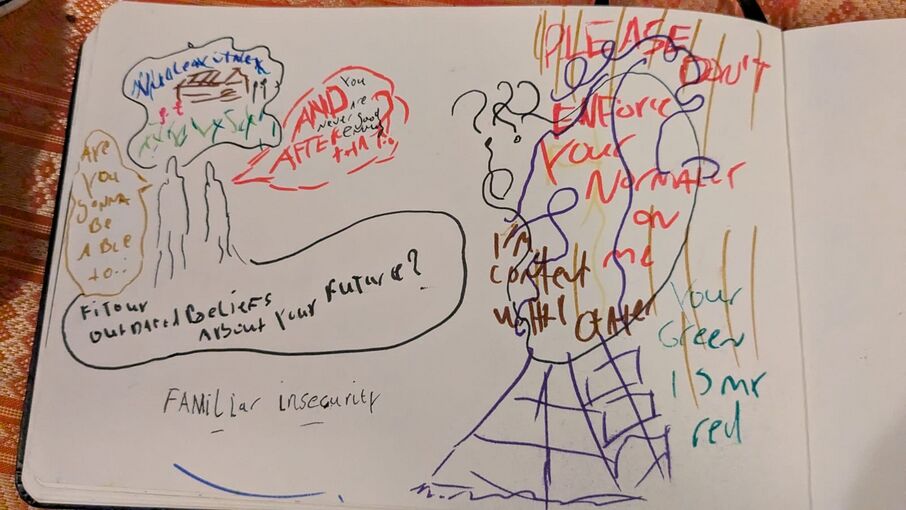
Martino Morandi suggested me to participate in Constants A cane, sticky notes, another body work session in the beginning of December 2024. The description got me excited for this amazing experience of new insights, As I am fully immersed into the subject of (in)access, (in)affordability and (dis)ability. The week chronologically consisted of Introduction rounds, overviews and logistics. There was an artist presentation about works concerning ableism.(Cripping the Space, Engagement Arts; compressed interviews on ableist experiences called Testimonies)/ privilege checklist and tools (some sort of manifesto in the shape of a checklist)
On this checklist, there was a questionable bulletpoint: Ik hoef bezoekers of personeel niet te onderrichten over structureel validisme. (I don't have to educate other people about structural valid-ism)
I raised both my question and my eyebrows, asking "how do you bridge the gap of knowledge then?" in which they responded in a matter of that they should be some sort of disability advisor and they don't do this for free.
After that, the day was concluded without the artist because they had to leave earlier.. And in the evaluation of the day. Complaints were made about their presentation. Which lead to a discussion concerning the context Belgian disability/coloniality and other national reputation and also that disability was more than a checklist.
The topics that then were discussed: - Amputation under modern slavery to unproductive people in Congo, - Gaza sunbirds > Team of cyclists from Gaza brought attention to the fact that coloniality/genocide creates disability. Making a list of disabilities in relation to inclusivity, ironically. To be fair, I don't discourage talking about these things. But this started my dissociating concerning the week.

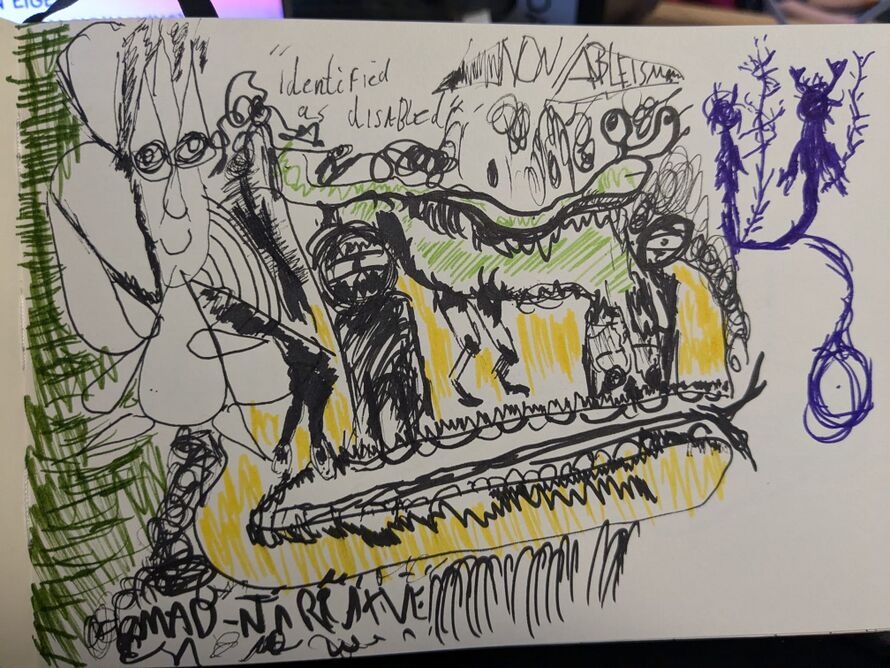
It feels like some sort of modern day privilege to identify as your condition. As a comic sketch that comes to mind, that people have learned these words from pop culture and then say to someone that can barely function because of the conditions that they have, that this new person identifies as disabled and then just goes around telling other people just how disabled they are. And to close this thought bubble of yet another frustration, a recent internet finding was that this online (self)diagnosis obsession results into a blend of popular social media trends into one. On one hand, people are getting diagnosed and the developments and benefits of it are seemingly improving as people get to get a clarification and understanding that explains why their brain works as it works. On the other hand. People are now finding out and obsessing over their newly found out diagnoses, which could cynically enough, be called a diagnose of 'recently diagnosed', what I then explain the symptoms to be as obsessed with their new findings, going online and deepdive in sicktocks[cite needed] that sometimes just consists of skits of symptoms. But also is leading to an online checklist in a video of 30 seconds which not only abuses an attention span but also miseducates because it is a fuckin spectrum to begin with. There are now collective thought streams going around, navigating symptoms based on astrology. So that the place and time where and when you are born, define your conditions. [24] And I feel that in these surroundings, these identities are being blend as a whole, while their contexts and nuances differ tremendously.
So in this case the threshold on both progressive in-fighting and conservative close families are something that does not exactly help me or us get around in our surroundings.
So from the idea of our (mother/brother/me), how do I imagine an ideal world?
In this idea I see myself living in a space with wheelchair/mobility accessible entrances so either bottom floor or elevator to my space. I see a permanent ramp at my mothers place but also at culturally legendary spaces like Cinerama.
The services of getting around my brother and mother need to be better.
https://www.rijnmond.nl/nieuws/1930343/vervoerder-trevvel-spant-kort-geding-aan-tegen-gemeente-rotterdam-we-maken-ons-grote-zorgen
https://www.government.nl/topics/care-and-support-at-home/social-support-act-wmo
https://www.rotterdam.nl/wonen-leven/vraagwijzer
https://www.trevvel.nl/trevvel-sociaal/uit-thuis-agenda/
https://www.verwijswijzer.nl/rotterdam/hulpmiddelen-en-aanpassingen/aanvullend-openbaar-vervoer.html
https://openrotterdam.nl/directeur-miniworld-woest-nadat-senior-klant-drie-uur-moet-wachten-op-taxi/
https://www.rijksoverheid.nl/onderwerpen/zorg-en-ondersteuning-thuis/wmo-2015
https://www.trevvel.nl/doelgroepenvervoer/trevvel-samen/
https://www.government.nl/topics/care-and-support-at-home/social-support-act-wmo
https://www.rotterdam.nl/wonen-leven/vraagwijzer
https://www.trevvel.nl/trevvel-sociaal/uit-thuis-agenda/
https://www.verwijswijzer.nl/rotterdam/hulpmiddelen-en-aanpassingen/aanvullend-openbaar-vervoer.html
https://openrotterdam.nl/directeur-miniworld-woest-nadat-senior-klant-drie-uur-moet-wachten-op-taxi/
https://www.rijksoverheid.nl/onderwerpen/zorg-en-ondersteuning-thuis/wmo-2015
https://www.trevvel.nl/doelgroepenvervoer/trevvel-samen/
- ↑ an infrastructure for counter-mapping / anti-campaigning by showing (human) complications
- ↑ Unity3D, Cinema4D, Unreal Engine
- ↑ Jump up to: 3.0 3.1 "PDD-NOS stands for Pervasive Developmental Disorder-Not Otherwise Specified. PDD-NOS was one of several previously separate subtypes of autism that were folded into the single diagnosis of autism spectrum disorder (ASD) with the publication of the DSM-5 diagnostic manual in 2013. In the past, psychologists and psychiatrists often used the term “pervasive developmental disorders” and “autism spectrum disorders” (ASD) interchangeably. As such, PDD-NOS became the diagnosis applied to children or adults who are on the autism spectrum but do not fully meet the criteria for another ASD such as autistic disorder (sometimes called “classic” autism) or Asperger syndrome. Like all forms of autism, PDD-NOS can occur in conjunction with a wide spectrum of intellectual ability. Its defining features are significant challenges in social and language development. Some developmental health professionals refer to PDD-NOS as “subthreshold autism." In other words, it’s the diagnosis they use for someone who has some but not all characteristics of autism or who has relatively mild symptoms. For instance, a person may have significant autism symptoms in one core area such as social deficits, but mild or no symptoms in another core area such as restricted, repetitive behaviors." https://www.autismspeaks.org/pervasive-developmental-disorder-pdd-nos
- ↑ Sotos syndrome is a genetic disorder, described in 1964, characterized by excessive growth before and after birth, a large, elongated (dolichocephalic) head, distinctive facial configuration, and a non-progressive neurological disorder with intellectual disability. Advanced bone age is present in approximately 75 to 85% of patients. https://rarediseases.org/rare-diseases/sotos-syndrome/
- ↑ https://www.bladderandbowel.org/stoma/what-is-a-stoma/
- ↑ https://www.nps.org.au/medicine-finder/olimel-emulsion-for-infusion
- ↑ https://graduation.kabk.nl/2023/lorenzo-quint
- ↑ https://www.researchcatalogue.net/view/1702786/1702785
- ↑ Manoeuvre meaning, a movement or series of moves requiring skill and care or carefully guide or manipulate someone or something in order to achieve an end.
- ↑ My mother also uses a mobility scooter because she can not walk long distances, she also has arthritis and joint pain).
- ↑ Jump up to: 11.0 11.1 A customized transport company, name is pronounced as travel but written in phonetic Dutch. https://www.trevvel.nl/over-trevvel/
- ↑ Mantelzorg means cloak care in Dutch. The term was introduced by Johannes Hattinga Verschure in 1972. It describes the system of informal social care in the Netherlands. Informal care is the care for chronically ill, disabled and needy by relatives, friends, acquaintances and neighbours.
- ↑
- ↑ Trevvel Samen is basically 'traveling together'. You can apply for Trevvel Samen if you have an illness, handicap or of an age that public transport becomes impossible to use. It is a social taxi service that picks you up and delivers you to where you need to be.
- ↑ When you are in either Wet Langdurige Zorg (Long-term care act) [1] or Wet Maatschappelijke Ondersteuning (social care act) [2] it takes longer (so to 8 weeks) to process your application. https://www.verwijswijzer.nl/rotterdam/hulpmiddelen-en-aanpassingen/aanvullend-openbaar-vervoer.html
- ↑ (Fill in a form, call 14010 or visit a location.) https://www.rotterdam.nl/en/contact
- ↑ located at 51.92983779151647, 4.458618083805808
- ↑ located at 51.93351819907188, 4.4992117838060155
- ↑ located at 51.84548747796849, 4.351767508936801
- ↑ Mother, brother, me.
- ↑ Myoclonus is a type of uncontrollable movement that includes sudden, brief involuntary twitching, jerking, or spasm of a single muscle or a group of muscles. A person experiencing myoclonus cannot control it. Myoclonus is the word for the movements themselves. It is not a disease itself, but may be a sign of another neurological condition. https://www.ninds.nih.gov/health-information/disorders/myoclonus
- ↑ Locate at 51.942295527295805, 4.462758077714551
- ↑ https://www.stationbergweg.nl/
- ↑
- ↑ Vierde Nota Ruimtelijke Ordening Extra"; Fourth Memorandum on Extra Spatial Planning (src will be added)

